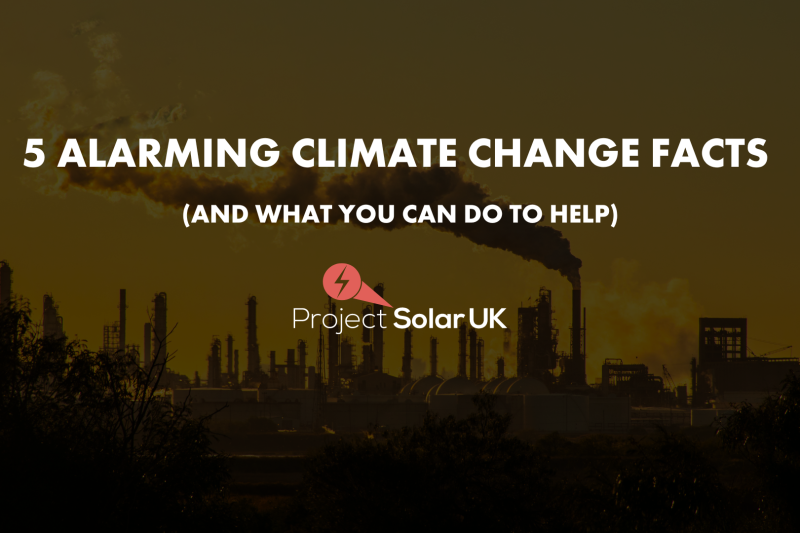The global impact of climate change is becoming impossible to ignore. Across the globe, we’re witnessing unprecedented heatwaves, devastating floods, and the relentless rise of sea levels.
The UK stands at the forefront of this global fight with its ambitious Net Zero 2050 targets, but the path forward is fraught with challenges. Today, Project Solar will unfold the stark realities of climate change through five alarming facts.
We’ll also tell you what you can do to fight for a greener future – because awareness is only the first step.
-
March 2024 was the warmest on record
March 2024’s global surface air temperature exceeded the pre-industrial average by 1.68 degrees Celsius, making it the warmest March since records began.
Surging temperatures are just one of the many impacts greenhouse gases have on our climate system. A BBC report highlights several key factors that have contributed to this record-setting warmth, including a weather system called ‘El Niño’.
‘El Niño’ refers to a naturally occurring climate pattern that leads to a temporary increase in global temperatures.
However, it has been particularly strong this year. This worrying phenomenon, along with our continued fossil fuel burning, underscores the role of human activities in pushing temperatures higher.
Scientists and climate experts warn that without substantial global action, we will continue breaking records as the climate crisis escalates.
-
US wildfires destroyed more than 1.7 million acres of land 3 months into 2024
The Independent highlights growing concerns as the US braces for an intensified wildfire season, expected to be one of the most severe in recent history.
Texas, Florida, Alabama and Missouri are already grappling with devastating fires, which are thought to have been exacerbated by climate change.
Earlier this year, in February 2024, Texas’ worst-ever wildfire ravaged the state and destroyed millions of acres of land.
In Virginia, wildfires destroyed hundreds of acres of Shenandoah National Park, and in March 2024, the central Appalachians faced several blazes that significantly increased fire activity.
Prolonged drought conditions, unusually high temperatures, and an abundance of dry vegetation are believed to have set the stage for these disastrous events.
However, experts suggest that these conditions are symptomatic of a broader climatic shift. Increased temperatures due to global warming are creating more volatile, unpredictable conditions, ideal for wildfires to spread rapidly.
This trend is not only a concern for the immediate future. If substantial environmental changes are not enacted, wildfires of this intensity may become the new normal.
-
Flooding is worsening in the UK, Australia and Russia
Recent reports from the UK, Australia, and Russia depict an alarming increase in flooding incidents. These separate events underscore the widespread impact of climate change on global weather patterns.
In the UK, flooding has become distressingly regular. According to the BBC, the country is experiencing an increase in extreme weather events, causing rivers like the Thames to burst their banks.
April 2024 saw some of the worst flooding in decades, with substantial economic losses also recorded worldwide, including in Australia.
Hundreds of Sydney residents were recently forced to evacuate due to severe flooding caused by unprecedented heavy rainfall. Infrastructure was overwhelmed, and homes were submerged as emergency services struggled to manage the fallout.
Meanwhile, in Russia, cities in the Urals and West Siberia are bracing for what could be the worst floods in decades. The rapid melting of heavy snowfall has compounded the situation, threatening to overflow riverbanks.
Local authorities are on high alert, with emergency operations underway to fortify defences and evacuate residents from high-risk areas.
-
Increased levels of CO2 in the atmosphere are damaging marine life worldwide
Humans aren’t the only creatures on Earth suffering climate change. The Royal Netherlands Institute for Sea Research (NIOZ) has unveiled troubling new insights into the effects on marine ecosystems.
The findings, which suggest a far more extensive impact than previously thought, indicate significant disruptions in biodiversity and health due to rising temperatures and acidifying oceans.
As the ocean absorbs about 30% of the carbon dioxide produced by humans, it becomes acidic. Increased acidity impairs calcifying species such as corals and shellfish, which are crucial for maintaining the ecological balance of our oceans.
Warmer waters hold less oxygen, and several parts of the oceans are experiencing reduced oxygen levels.
This phenomenon, known as hypoxia, leads to “dead zones”: areas where life is unsustainable. Hypoxic zones continue to expand and threaten a vast wealth of marine species.
To prevent further damage, the NIOZ and the National Oceanic and Atmospheric Administration (NOAA) call for more aggressive, comprehensive approaches to mitigate the adverse effects of climate change.
-
Climate change inaction is now considered a violation of human rights
With the planet continually facing destructive environmental disasters, the European Court of Human Rights ruled in April 2024 that inaction on climate change can indeed constitute a violation of human rights.
The landmark was in response to a case brought forward by hundreds of activists from the Swedish group ‘Senior Women for Climate Protection’. They argued that 46 European countries have failed to enact adequate measures to combat climate change. The judges noted the adverse effects of climate change, including extreme weather events and rising sea levels, as having a direct impact on individuals’ well-being.
So, what can you do to join the solar takeover?
Despite such troubling news, millions of scientists across the globe are working hard to tackle climate change.
There is hope that we can restore the planet by creating new technologies and making solar power more accessible to the public. You, too, have the power to make a difference. One of the easiest, most affordable ways to go green is by installing solar panels on your property.
By taking this step, you can proactively contribute to reducing climate change. If you’d like to start your own journey or learn more about what companies like Project Solar can offer, don’t hesitate to contact us.

